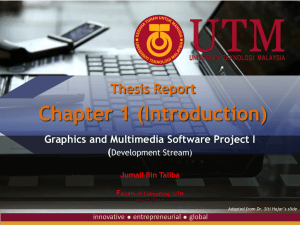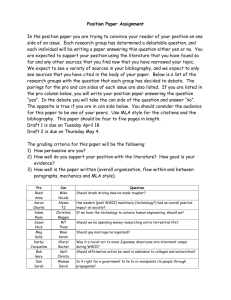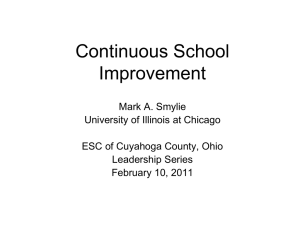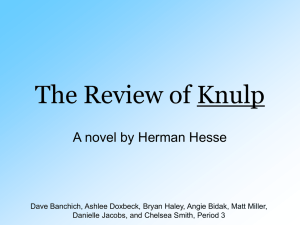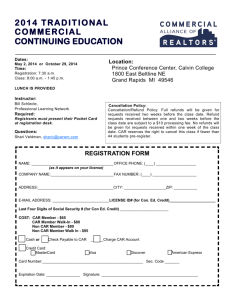PPT
advertisement
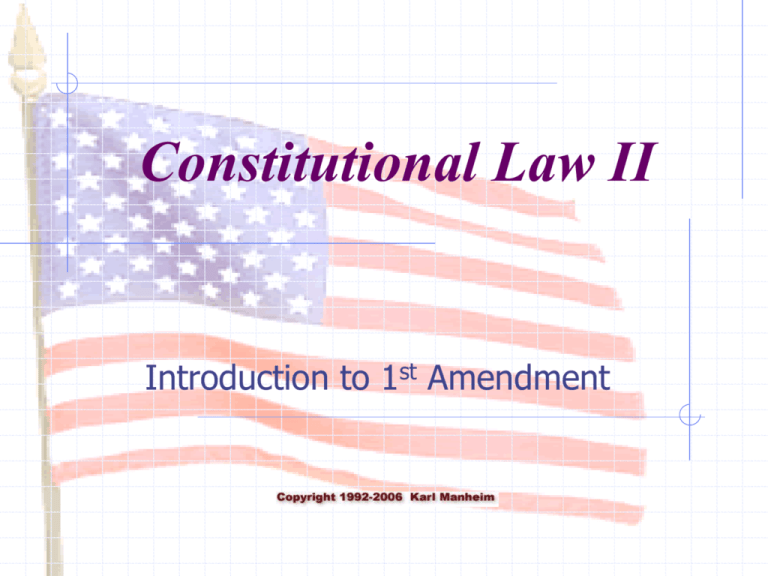
Constitutional Law II Introduction to 1st Amendment Galileo on trial - 1633 Prescribed Orthodoxy Fall 2006 Con Law II 2 Free Speech & the Enlightenment Maybe the church was right Fall 2006 Con Law II 3 Challenge to Orthodoxy Voted the most influential person of the 2d millennium Fall 2006 Con Law II 4 Reimposing Control Court of Star Chamber 1487-1641 Fall 2006 Con Law II John Twyn was arrested in 1663 for printing a book that offended the king. Twyn refused to reveal the name of the book's author, so he was publicly castrated and disemboweled, and his limbs severed from his body. Each piece of his body was nailed to a London gate or bridge.5 Controlling Speech Printing Monopolies Stationers Company monopoly (1557) enforced by the Court of Star Chamber Licensing “Licensing laws” (mid-16th century) prior restraints Milton (1644): “we do injuriously, by licensing and prohibiting, to misdoubt [truth’s] strength” Blackstone (1765): Freedom of press meant only no prior restraint Treason/Sedition Laws of seditious libel post restraints criticism of the government Fall 2006 Con Law II 6 Trial of John Peter Zenger (1735) English law of seditious libel Punishing statements derogatory of the crown Zenger prosecuted for criticizing Gov. of NY Actually, just publisher, not author see here Hamilton defends: truth is a defense Judge rejects; Jury acquits (“jury nullification”) 1st Amendment to the rescue Was its intent to Prohibit licensing (prior restraint) or also Post-publication sanctions? Fall 2006 Can it be expanded by its intent? How? Con Law II 7 Trial of Thomas Paine (1792) Britain tried Paine for seditious libel, in abstentia Fall 2006 Con Law II 8 Alien and Sedition Acts (1798) Prohibiting publication of “false, scandalous, and malicious writings .. against the government of the US with intent to defame, or stir up sedition or hatred” Truth was allowed as a defense (truth still not an absolute defense in British libel) Vigorous use to control political debate by Federalists against Republicans Jefferson pardoned all convicted apparently on federalism grounds, not free speech Fall 2006 S.Ct. never ruled on constitutionality Con Law II 9 Masses Pub. v. Patten (1917) Tribute "Emma Goldman and Alexander Berkman Are in prison to-night, But they have made themselves elemental forces. Like the water that climbs down the rocks, Like the wind in the leaves, Like the gentle night that holds us, They are working on our destinies, They are forging the love of the nations." Espionage Act of 1917 "Sec. 3. Whoever, when the US is at war shall willfully cause or attempt to cause insubordination, disloyalty, mutiny, or refusal of duty, in the military or naval forces of the US, or shall willfully obstruct the recruiting or enlistment service .. shall be punished by a fine of not more than $10,000 or imprisonment for not more than twenty years or both.“ Fall 2006 Con Law II 10 Masses Pub. v. Patten (1917) Learned Hand to cause insubordination, disloyalty, or mutiny requires more than words of persuasion lest it suppress all criticism of gov’t policy Distinguish direct encouragement (advocacy) to violate the law Ultimate action by a listener through intermediation of mind is not the responsibility of the speaker Statutory construction so as to avoid const’l problems unless congress clearly forces the issue Reversed by 2d Cir Fall 2006 “Act does not repress legitimate criticism of Congress” Con Law II 11 Schenck v. US (1919) Violation of the Espionage Act Leaflets sent to draftees during WWI stating that conscription violated the 13th Amd. Holmes If actual obstruction of the draft is illegal “liability for words that produced that effect might [also] be enforced” Fall 2006 Speech that would be lawful if said during peacetime may be prohibited during war Famous “fire in a theatre” analogy Con Law II 12 Abrams v. US (1919) Espionage Act of 1918 whoever, when the US is at war, shall willfully utter, print, write, or publish any disloyal, profane, scurrilous, or abusive language about the form of government of the US, or advocate any curtailment of production in this country of any thing or things, product or products, necessary or essential to the prosecution of the war [shall be punished] Leaflets President Wilson’s “shameful, cowardly silence about the intervention in Russia reveals the hypocrisy of the plutocratic gang in Washington and vicinity." Holding Fall 2006 Intent to incite resistance could be punished Con Law II 13 Abrams v. US (1919) Holmes’ Dissent Hostility toward Wilson was not the same as disloyalty toward the US or its form of government Clear & Present Danger Test US constitutionally may punish speech that produces or is intended to produce a clear and imminent danger that it will bring about forthwith certain substantive evils that the US constitutionally may seek to prevent This “silly leaflet” presented no immediate danger Competition in the Marketplace of Ideas Fall 2006 time has upset many fighting faiths; the ultimate good desired is better reached by free trade in ideas Con Law II 14 Subversion Antecedents in law of seditious libel Focus on bad effects (listeners’ response) Illocutionary (persuasion), not instrumental (impact) See Learned Hand in Masses Publishing v. Patten (1917) Espionage Act (1917) Forbad interference with war effort by causing insubordination or fomenting discontent Upheld in Schenck v. US (1919) (convicted for circulating copies of 13th amend to conscripts, which had tendency to obstruct recruiting service) Holmes: Fall 2006 question is whether the words are of such a nature as to “create a clear and present danger that they will bring about substantive evils that Congress has right to prevent” Con Law II 15 Dennis v. US (1951) Smith Act See also Criminal Syndicalism Act (anarchy) Forbad advocating economic or political change through unlawful means Including membership in groups advocating same Communist, socialist, leftist parties Not necessary to share those views; membership is enough Unlawful acts need not actually occur Under Clear & Present Danger test, can punish Acts in furtherance of illegal conduct, short of attempt How far removed or attenuated in space/time? Fall 2006 Con Law II 16 Dennis v. US (1951) Clear & Present Danger test per Learned Hand “whether the gravity of the `evil,’ discounted by its improbability, justifies such invasion of free speech as is necessary to avoid the danger.” Is this a test or a principle? How do you apply it? Abstract advocacy sufficient because of “inflammable world conditions” Is it pro-speech or pro-government? Yates v. US (1957) Distinction between advocacy of abstract doctrine and incitement of unlawful action first significant departure Fall 2006 Con Law II 17 Brandenburg v. Ohio (1969) Incitement Ku Klux Klan rally “Give us our state rights. Freedom for the whites. We’re not a revengent organization [but] it’s possible that there might have to be some revengeance taken. We are marching on Congress July the 4th, 400,000 strong.” Why was Ohio Criminal Syndicalism Act invalid? Failed to distinguish between abstract advocacy and These criteria treat the speech as part of the action Fall 2006 incitement to imminent lawlessness, likely to occur Incitement: urging, exhortation, solicitation Imminence: proximity in both space & time Lawlessness: act must itself be illegal Likelihood: need not wait for illegal act; but if unlikely to occur, then it is abstract speech that is being punished Con Law II 18 Solicitation Model Penal Code, § 5.02 (1) Definition of Solicitation. A person is guilty of solicitation to commit a crime if with the purpose of Seems to promoting or facilitating its commission he commands, follow encourages or requests another person to engage in Brandenspecific conduct that would constitute such crime or an burg attempt to commit such crime or would establish his complicity in its commission or attempted commission. (2) Uncommunicated Solicitation. It is immaterial under Subsection (1) of this Section that the actor fails to Does communicate with the person he solicits to commit a this? crime if his conduct was designed to effect such communication. Fall 2006 Con Law II 19 Special Case: Prior Restraints Originally – licensing schemes Currently – any gov’t action designed to prevent speech from occurring Licensing (parade permits) [administrative] Especially if based on Injunctions [judicial] the content of speech What makes prior restraints so bad? Fall 2006 Predictive: determined before speech occurs Punishment based on rule violation, not the speech itself Any beneficial effect of speech is entirely lost Con Law II 20 Prior Restraints Comparing Prior and Post-Restraints Both have a deterrent effect Specific deterrent with prior restraint General deterrent with post (punishing bad speech) Procedural protections differ Prior restraint – easier to prove violation administrative or judicial (w/o jury) Post restraint – harder to prove Fall 2006 jury trial Blackstone thought freedom of speech lay solely in protection from prior restraints Con Law II 21 Near v. Minnesota (1931) “There have been too many men in this city and especially those in official life, who HAVE been taking orders and suggestions from JEW GANGSTERS, therefore we HAVE Jew Gangters, practically ruling Minneapolis.” "Every snake-faced gangster in the Twin Cities is a JEW. Jew gangsters practically rule Minneapolis." Enjoined as a public nuisance (malicious, scandalous, defamatory) Fall 2006 Con Law II 22 Near v. Minnesota (1931) Would any remedy, short of restraining the speech, redress the injury caused by Near? When can prior restraints be justified? Near exceptions: “actual obstruction to the recruiting service … announcing the sailing dates of transports, or the numbers and location of troops” Unprotected speech Obscenity Incitement of violence Fall 2006 Con Law II This speech is protected, but PR survives superSS PR allowed if speech is unprotected; but how do you know?23 Court Injunctions Walker v. City of Birmingham (1967) Injunctions (even if unlawful) must be obeyed Collateral bar rule prohibits testing constitutionality of the injunction after it is violated Court order must be procedurally valid E.g., court has jurisdiction Notice, hearing, etc. Compare other collateral challenges to court orders Fall 2006 Con Law II 24 Licensing Schemes Permit requirements for use of public street Justified by regulation of non-speech activity Void schemes vs. invalid application If scheme is void (ex: too much discretion) Then speakers need not seek permits Poulos v. New Hampshire (1953) Can collaterally attack law If scheme is valid Speakers must seek permits If permit wrongly denied, must seek review Cannot collaterally attack the law or its application Fall 2006 Shuttlesworth v. Birmingham (1969) Con Law II 25 Watchtower Bible v. Stratton (2002) Laws prohibiting solicitation are invalid Despite purpose of protecting others’ privacy More nuanced (less restrictive) balancing is required Laws requiring solicitation permits Cantwell v. Conn (1940) (invalidating law that gave unfettered discretion to admin. official) Ad hoc balancing required here too Commercial speech/financial solicitation State interest higher, and speech interest lower Political speech/non-financial solicitation Fall 2006 State interest lower, and speech interest higher Con Law II 26

